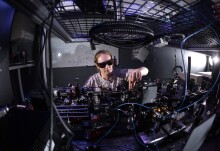

Twenty eight members of staff at Imperial rewarded for dedication to students - News
Wednesday 2 June 2010
By Abigail Smith
See also:
Related New Stories
Staff who have shown exceptional dedication to developing, advancing and supporting students at Imperial have been recognised this week with Rector’s Awards for Excellence.
Twenty one academics receive Awards for Excellence in Teaching, Excellence in Pastoral Care and Excellence in Research Supervision, after being nominated by their colleagues with the support of students. A further seven receive Medals in recognition of their exceptional work.
Given annually, the awards aim to reward staff who play a leading role in enhancing student academic experience at the College, both through their work with individuals and through implementing department, faculty or College-wide improvements. Professor Julia Buckingham, Pro Rector, Education, says:
“Imperial is fortunate to attract highly talented students from around the world, and nurturing their abilities in a supportive environment is one of our most serious, and often most enjoyable, responsibilities.
“In giving special recognition to people who have made really outstanding contributions to educating and supporting students, I hope that we are sending a message to everyone involved in maintaining the College’s high standards that their work is critically important and enormously appreciated by both staff and students.”
Excellence in Teaching
This year’s four Medal and 12 Award winners in the Excellence in Teaching category won praise for their imaginative lecturing techniques, such as maths demonstration lectures that make use of doughnuts, tennis rackets and boomerangs, as well as for their willingness to help students on a group and one-to-one level.
Each winner’s nomination was strongly supported by students, who highlighted approaches such as offering drop-in clinics where students can ask questions that they may have been too intimidated to ask in the lecture theatre. Other popular initiatives include videoing lectures so that they can be watched again and the Faculty of Engineering’s ‘flexi-Friday’, which allows students to take elective courses in different departments.
Students also expressed appreciation for the vast personal experience of their lecturers, which enables them to place teaching in a real-world context. Examples include Medal winner Professor Anthony Bull, of the Department of Bioengineering, whose knowledge of biomedical engineering design issues in developing countries enabled a group of students to set up a workshop to produce orthopaedic aids in Zambia.
All-terrain wheelchair designed by one of Anthony Bull's students
The three other Medal winners in this category are Professor Nigel Bell, Centre for Environmental Policy, Dr Frank Berkshire, Mathematics, and Professor Martin Liebeck, Mathematics, who is described as having gained a “cult following” amongst students after taking part in an Imperial version of Strictly Come Dancing.
Winners of Awards for Excellence in Teaching are Dr Jeremy Bradley, Computing, Dr Oscar Ces, Chemistry, Dr Tilly Collins, Life Sciences, Mrs Jennifer Jones, National Heart and Lung Institute, Professor Mike Laffan, Medicine, Dr Simon Leather, Life Sciences, Professor Nick Long, Chemistry, Dr Mark Sutton, Earth Science and Engineering, Professor Peter Torok, Physics, Dr Luc Vandeperre, Materials, Dr Ramon Vilar, Chemistry, and Dr Jill Warner, Medicine.
Excellence in Pastoral Care
Medals and Awards for Excellence in Pastoral Care recognise staff who help to provide a supportive learning environment in a range of roles, including tutors, hall wardens and staff in undergraduate and postgraduate departmental offices, all of whom offer a variety of help and guidance.
The two Medal winners and four Award winners are recognised for the exceptional care they show for students, winning praise for offering sympathetic, non-judgemental counselling and for their willingness to make themselves available at very short notice to students who need advice. Medal winner Margaret Cunningham, of the Department of Computing, is singled out for the thorough care that she provides for all students who need help, such as her support of a student whose eyesight progressively deteriorated over the course of his studies. Describing how she provided him with tools such as computer speech software, and acted as his amanuensis to write exam answers as he dictated when no one else was available to do so, the student said:
“She did not let me give up and always provided practical solutions. I owe my future to so many people during my time at Imperial, but the key person who put everything together and made things happen was Margaret.”
The winners are also recognised for making improvements to pastoral care systems across the College. Medal winner Dr Mike Emerson of the School of Medicine is described as having “transformed” pastoral care in the Faculty of Medicine by recruiting 65 new tutors, running tutor training programmes and introducing formally timetabled tutorial sessions. College Tutor Dr Anna Thomas-Betts, who wins an Award, is credited with being the driving force behind the fact that pastoral care of students is now one of the criteria taken into account in the College’s academic promotions process.
Awards for Excellence in Pastoral Care also go to Professor Paul Luckham, Chemical Engineering, Dr Sara Rankin, National Heart and Lung Institute, and Dr Lynda White, Mathematics.
Dr Emerson and Mrs Cunningham will formally receive their Medals for Excellence in Pastoral Care at the College’s Commemoration Day graduation ceremony in October 2010.
Excellence in Research Supervision
The one Medal winner and five Award winners in the Excellence in Research Supervision category are all praised by their nominators for their enthusiasm for supporting and mentoring people in the early stages of a research career.
This support takes many forms, including the ability to enthuse their students and create a supportive environment thatencourages open discussion of their data and related literature, encouraging them to develop their scientific reputation by publishing and presenting their findings at scientific meetings, and facilitating access to other experts in the field to allow st udents to develop a broader perspective on their work and their future career. A student of Award winner Professor Geoff Garnett of the School of Public Health comments:
“Because he is a towerin g figure in his field internationally, he has global access to the latest developments and international collaborations. The access to gray [unpublished] literature and to discussions with funders such as the Bill and Melinda Gates Foundation, the Wellcome Trust, the MRC, DfID and with normative institutions like UNAIDS and WHO allowed me not only to produce a policy-relevant PhD but also gave me a behind the scenes knowledge that has been key to me defining my career interests and getting a position today that I enjoy.”
The approachability and availability of all winners is highlighted as a vital attribute of a successful supervisor. Medal winner Professor Michael Stumpf, Department of Life Sciences, is described as offering “almost constant access” to his students, as well as building team spirit through informal activities, including taking part in the Hyde Park Relays with his group this year.
The other Award winners in this category are Dr Mark Birrell, National Heart and Lung Institute, Dr Ned Ekins-Daukes, Physics, Dr Paul Kemp, National Heart and Lung Institute, and Professor EJ Milner-Gulland, Life Sciences.
Professor Stumpf will formally receive his Medal for Excellence in Research Supervision at the College’s Postgraduate Awards Ceremony in May 2011.
Article text (excluding photos or graphics) available under an Attribution-NonCommercial-ShareAlike Creative Commons license.
Photos and graphics subject to third party copyright used with permission or © Imperial College London.





